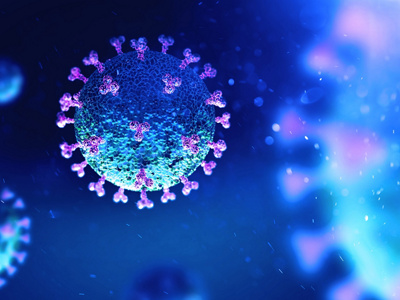The Covid-19 illness is an infection of the respiratory tract that can sometimes be severe. It is transmitted by a novel virus that rapidly spread throughout the world and resulted in a pandemic. The severe cases can occur in such high numbers that the healthcare systems in individual countries are stretched to capacity. Therefore, unparalleled efforts are being made worldwide to contain the virus and provide treatment options.
Cause
Covid-19 is caused by being infected with a novel beta coronavirus that was first identified in China in 2019 as the cause of a respiratory tract infection that is sometimes severe. By analogy with a coronavirus that appeared previously, the virus was designated SARS-CoV-2 (severe acute respiratory syndrome coronavirus type 2).
Where the virus originated has not been determined definitively. Transmission from animals to humans in combination with a mutation of the virus is the current prevailing theory.
Infection
Infection primarily occurs via the respiratory tracts via transmission through viral particles in the air (droplets, aerosols) generated when breathing, coughing, speaking and sneezing. Transmission of viral particles that adhere to surfaces and are introduced into the oral and nasal cavities via the hands is also possible.
Symptoms, course of the disease
The course of the disease and the symptoms can vary greatly. The assumption is that approximately 80 % of infected persons have no symptoms or only very mild cold symptoms. The symptoms generally appear 5-6 days after infection. Mild symptoms like headaches and a sore throat are usually the first indications. Typically, coughing and fever follow. A loss of taste and smell can also arise and are characteristic distinguishing features with respect to the flu or a simple cold. Congestion and sneezing, however, are seldom symptoms of a Covid-19 infection. The gastrointestinal tract can also be affected. Sometimes, symptoms like diarrhoea, nausea and vomiting are even the more prominent symptoms. Approximately 20 % of cases develop into severe pneumonia and respiratory distress. In severe cases, care in an intensive care unit and connection to a ventilator is required.
Risk factors
Severe cases are observed in young and otherwise healthy patients. More frequently, however, these severe cases arise in patients with one or more of the following risk factors:
- Age over 65
- Cardiac and circulatory diseases, high blood pressure
- Chronic lung disease (COPD)
- Chronic liver and kidney diseases
- Diabetes Mellitus
- Compromised immune system
- Cancer
- Overweight
Treatment
Since the first appearance of cases, various treatment options have been considered and effective medications are being researched intensively. To date, antiviral medications (Remdesivir), anti-inflammatory medications (cortisone) and blood-thinning medications have proven to be effective treatment options in severe cases.
Prevention, preventive care
Preventing contagious infection and interrupting the infection chains play a major role in containing the Covid-19 pandemic. This includes well-known measures like disinfecting your hands, wearing a mask and maintaining a safe distance from others. Massive efforts are being made at various locations worldwide to develop a vaccine. Several vaccines are already on the threshold of being approved by the relevant pharmaceutical regulatory authorities, so a vaccine is expected in the foreseeable future.
Why choose Hirslanden
The specialists at Hirslanden, the largest private hospital group in Switzerland, are renowned for their expertise and many years of experience in treating your illness.
You can expect comfortable rooms and a modern infrastructure as well as the highest standards in medicine and care.
We will help you throughout your entire stay, organising additional services such as translators and interpreters, transport, and overnight hotel stays for you and your relatives, and addressing all your administrative questions.
A personal contact from the Hirslanden International team will take care of your needs from the time that you first contact us to arrange an appointment through to the end of your treatment.
Contact us – we are happy to help you!

